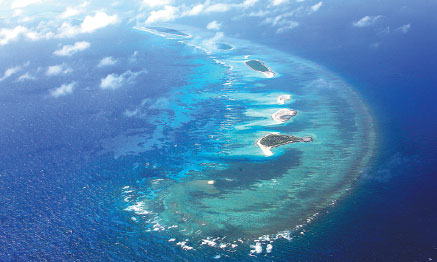'Patron' promotes safer, greener environment
The sea has been a pivotal part of Wang Chun's career since 1993 and his tide of progress has seen him now lead a working team that governs a slew of islands and waters. His role has earned him the affectionate title of "Patron of the Islands".
The islands group he is responsible for within the Xisha Islands is called Qilianyu, "seven islands in a string".
Qilianyu forms a special part of Sansha city's administration because Wang's committee combines five organs in one - a police station, border defense branch, law enforcement workstation, militia command and a medical, rescue and aid center.
Wang is often the first person that officials visiting the islands will turn to. There they are guaranteed a friendly welcome by Wang, whose deeply tanned complexion shows he is a man who enjoys the outdoor life, an impression enhanced by his favorite attire of a wide-brimmed hat and all-weather jacket.
Wang and the islanders are at the forefront of protecting the ecology of the South China Sea by regulating fishing activities. They have also encountered, and firmly dealt with, illegal fishing by foreign ships from neighboring countries.
Illegal fishing? This is not innocent fly-cast fishing. The crews on board these vessels often use dynamite to kill the fish and the explosions cause immense damage to the fragile marine ecology.
"The ecology here is very vulnerable, and recovery is extremely difficult," Wang said.
For centuries, the islands have played a crucial part both in the work and lives of Chinese fishermen. Wang likes to show visitors a traditional temple frequented by fishermen on Zhaoshu Island for blessings before they went out on the perilous sea.
Another must-see place is the old office of the village committee, a bungalow built in the 1970s just a few meters away from the new committee building, a testament to China's unbroken presence and jurisdiction.
Partly because of shrinking fishery resources, "traditional fishermen on the islands have been encouraged to shift to other sectors", Wang said.
"Some fishermen have become cooks and yacht captains, some work in the power plants, and some nurture pearls and seashells for scientific institutions," Wang said.
The islands may be remote, but they are connected. They are fully covered by a cellular network and the meeting room on the second floor of the committee building has a videoconferencing system.
As the annual typhoon season - usually from June to October - is around the corner, Wang said they had a contingency plan in place and the building could function as a shelter for the residents.
"In the past, we transferred the island's residents to nearby Yongxing Island. Now there is no need as our building integrates the five stations," Wang said.
Wang said his committee sends extreme weather alerts to the residents and fishing boats will be taken onshore.
Living conditions on the islands have seen a marked improvement. Modern housing is replacing the flimsy wooden dwellings that appeared randomly on Zhaoshu Island and offered little in the way of protection from the elements.
Construction commenced May last year on the first batch of 27 houses for local residents and they will have all modern conveniences.
Apart from offering shelter from the extreme weather, both sun-baked days and violent wind-fuelled storms, the new housing will allow children and the elderly to stay indoors at enjoy the comforts of home.
Island life is not all sunshine, and the man with the wide-brimmed hat seems ready for any situation.
Internet campaigns boost protection of ecosystems on Xisha Islands
Thanks to the cellular network and Wi-Fi on Zhaoshu, an island in the Xisha chain, simply scanning a QR code on a label hanging from a coconut tree will tell you who has adopted and financed it.
In February, Sansha city launched an online bidding campaign that allowed people to adopt 500 coconut trees. The campaign was so popular that all the trees were sponsored within 24 hours.
Wang Chun, head of the Qilianyu working committee who lives and works on Zhaoshu Island, told China Daily that a second round of adoptions may be held in July, with 300 to 500 trees available for sponsorship.
"There will be more such campaigns, and we are also exploring allowing people to adopt shell-dwelling invertebrates, such as mollusks, for nurturing," Wang said, adding that the animals would help to balance the marine ecology and purify the waters.
Xiao Jie, the mayor of Sansha, adopted the first coconut tree in the first batch.
"The greening programs, which have been in operation for more than three years on islands - including Zhaoshu - have resulted in greater plant coverage, which has improved living conditions for the residents," he said.
Shi Guoning, head of Sansha's Bureau of Land Resources and Environmental Protection, said the completion of water desalination plants on islands in the Xisha chain has tackled a chronic shortage of fresh water and produced conditions that allow an increasing number of plants to thrive.
zhangyunbi@chinadaily.com.cn
|
A bird's view of Qilianyu islands. |



















